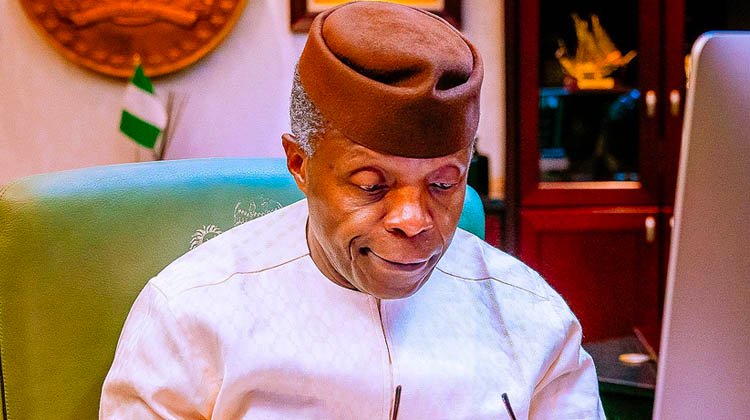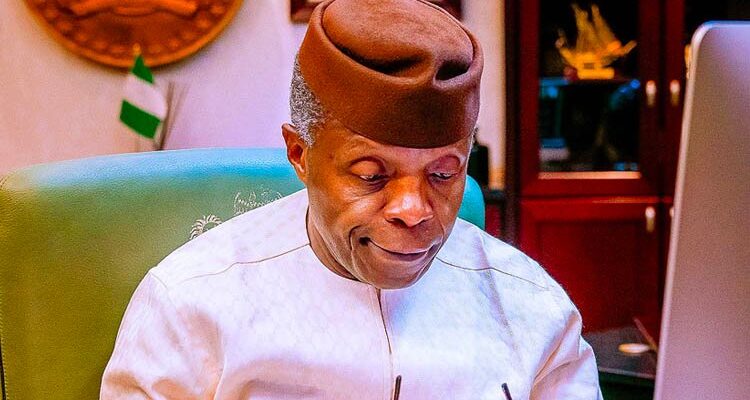
Reports of the various judicial panels set up by states to resolve issues of police brutality are to be reviewed at a special session by the National Economic Council (NEC), it was learned on Thursday.
The panels were constituted by the states and the Federal Capital Territory (FCT) following the #EndSARS protests that rocked state capitals and some major cities last year. The protests led to loss of lives, destruction of private properties and public infrastructure.
Vice President and Chairman of Council Yemi Osinbajo dropped the hint of plans to appraise the reports during the monthly NEC meeting.
The meeting, which held virtually, had in attendance governors, top government officials, and the Central Bank of Nigeria (CBN) Governor.
According to a statement by Senior Special Assistant to the President on Media and Publicity, Office of the Vice President, Mr. Laolu Akande, some states have submitted their reports to the NEC, adding that others were being awaited.
It reads: “The vice president at today’s meeting announced that a special session of NEC will soon be convened to consider all the reports that are ready from the judicial panels set up late last year to address the concerns of the Nigerian people on police brutality allegations and other related issues.
“That meeting would also consider the implementation of the reports including remedies, redress and compensations.”
The Vice President also inaugurated the 29-member National Road Safety Advisory Council, which he sits over as chairman.
He said: “Also at the meeting, Prof Osinbajo inaugurated the National Road Safety Advisory Council as a demonstration of government’s continued commitment to addressing the challenges of road safety in the country.
“The Advisory Council is a critical aspect of the updated National Road Safety Strategy adopted by NEC and approved by the Federal Executive Council late last year.
“The Road Safety Advisory Council is chaired by Vice President Yemi Osinbajo, with the Corps Marshal of the Federal Road Safety Corps (FRSC), Mr. Boboye Oyeyemi as Secretary. Other members of the 29-member Advisory Council include: Six governors representing the six geo-political zones.”
Other committee members include governors Willy Obiano (Anambra) representing the Southeast; Ifeanyi Okowa (State) representing the Southsouth; Babajide Sanwo-Olu (Lagos) representing the Southwest.
Other are: Muhammad Inuwa Yahaya (Gombe) representing the Northeast; Nasir El-Rufai (Kaduna) representing Northwest and Abdulrahman AbdulRasaq, (Kwara) representing the Northcentral; Secretary to the Government of the Federation (SGF) Boss Mustapha; ministers and the National Security Adviser (NSA).
The President, Association of Local Government of Nigeria (ALGON); President, Nigeria Association of Chambers of Commerce, Industry, Mines and Agriculture (NACCIMA); President, Nigerian Society of Engineers (NSE); and the Board Chairman, Federal Road Safety Commission (FRSC), are also members.
The NEC also received a report from the Ministry of Petroleum Resources and the Nigerian National Petroleum Corporation (NNPC) on the issue of the terminated “Strategic Alliance Agreements” with solution options.
“Deliberations on this will continue at another meeting of the Council, it was resolved so as to give members the opportunity to properly review and consider the presentation from the NNPC,” the statement read.
The Council also received a presentation from the Minister of Humanitarian Affairs, Disaster Management & Social Development, Hajiya Sadiya Umar Farouq, on the establishment of Sexual Assault Referral Centres (SARCs) to address the problem of sexual and gender-based violence.
She said the centres, which would operate as one-stop-shop, will reduce the physical and mental health consequences of rape and sexual assault by providing free, accessible, multi-agency, forensically secured service for survivors.
The minister was quoted as telling the Council: “Sexual assault can have a devastating impact on every aspect of survivor’s lives which can make them vulnerable to further episodes of sexual abuse or violence.
“There can be long-term physical and psychological impacts and this includes post-traumatic stress disorder, depression, anxiety, inability to sleep, etc.
“People who have experienced sexual assault have three main care needs: medical care; psychosocial care and assistance; and support from the criminal justice system.”
It further stated that the Minister of State for Budget and National Planning gave the Council an update on the various federation accounts, as at June 16, 2021.
According to him, the Excess Crude Account (ECA) stood at $60,850,975.92; the Stabilisation Account was N24,802,716,416.22; while the Development of Natural Resources Account stood at N28,215,689,963.31.

Comments